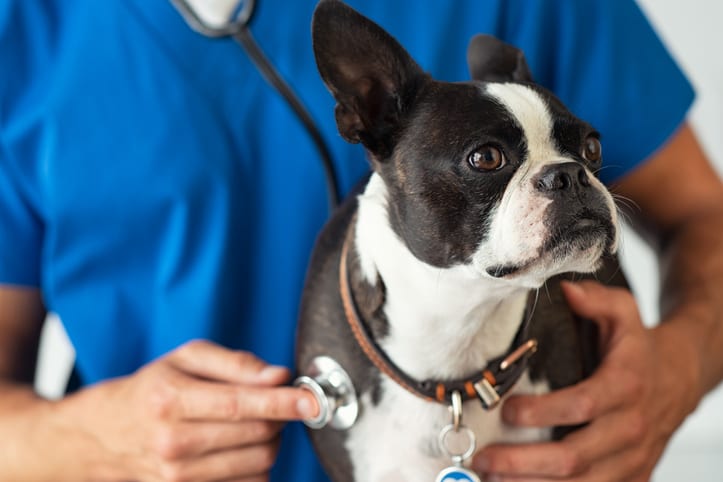There are so many important things to remember when bringing home a puppy. You have to set up food and water bowls and a place to sleep. She needs lots of toys and grooming supplies. You need to go through and puppy-proof by hiding cords and keeping important items out of her reach. And you need to schedule an appointment with the veterinarian to start her dog vaccination schedule. This can feel totally overwhelming. Just remember, it’s all worth it to have a lifelong companion by your side.
Your Dog’s Vaccination Appointment in Zion, IL
You should schedule your first vet appointment within a few days of bringing home your new little fur ball. At the first appointment, the veterinarian will go over everything you need to know about puppy care. This will include discussing the vaccination schedule. Each situation is unique and depends on a few factors like your puppy’s age, breed, where he came from (breeder, shelter, etc.), litter size, and where in the country your puppy came from. From there, your veterinarian will give a personalized recommendation for the dog vaccination schedule.

The Importance of Dog Vaccinations
Dog vaccinations are important because they prevent diseases. Some of these diseases are treatable if they are contracted and some are not. Vaccines are split into two categories, core and non-core. Core vaccines are necessary for all dogs to get due to the risk of exposure, severity of the disease, or the transmissibility to humans. Non-core vaccines are optional because of the risk of exposure is not as severe. Your vet may recommend a non-core vaccine as a necessary one due to your geographic region. Some parts of the country need additional protection.
Dog Vaccination Schedule
In your puppy’s first year, the vaccination schedule is pretty intense. Every three to four weeks you’ll need to take him in for a new round of shots and boosters. Here’s a quick run down of what the first year looks like:
6-8 Weeks
The vaccines your puppy will likely get in this time frame are DA2P, Bordetella, and canine influenza. You can also opt for the non-core vaccine for canine coronavirus.
9-12 Weeks
The vaccine schedule at this point kind of depends on what you did from 6-8 weeks. There is a chance you didn’t get your puppy until he was 9-10 weeks old so you would be doing the DA2P, Bordetella, and canine flu. If you got these vaccines in the 6-8 week range, it’s probably time for a booster. Both DA2P and Bordetella require a booster 4 weeks after the original vaccination. Canine influenza could be anywhere from 2-4 weeks, but your vet will likely lump them all together to make it easier on you.
12-16 Weeks
If your puppy was given all of afore mentioned vaccines at 6-8 weeks, then they will have probably already received their boosters. If not, you’ll be needing those. The DA2P shot also requires a parvo only booster at 16 weeks.
At 13 weeks, it’s time to get the rabies shot. This is a core vaccine and is often required by the state and most rental properties. If you chose to get the Leptospirosis vaccine, you will need to get a booster at this time. Another non-core vaccine you might choose to get for your pup is the Lyme disease vaccine.
15-17 Weeks
At this point, you’ll have just the parvo booster for your core vaccine. If you elected to get the Leptospirosis or Lyme vaccine, you will need a booster around this time.
The Next Steps for Dog Vaccinations
So, your puppy made it through all of these vaccines and now it’s been almost a year since you’ve been to the vet. What can you expect at your check up? Will he need more shots? There’s a new movement gaining popularity to not vaccinate yearly. Similar to the movement to not vaccinate human children, their argument is that it exposes your dog to the disease and can be detrimental to his health. However, according to studies done, there is no evidence that an annual booster vaccination does any harm to dogs.
If you aren’t wanting to do a booster unless it’s necessary, you’ll have to have your vet do a blood test to determine what antibodies your dog has. If they aren’t sufficient, you’ll need to get the booster. The problem is, that these blood tests are more expensive than the boosters themselves and can cause added stress to your dog.
Your dog may be considered low-risk enough that you can get on a three year booster schedule but that is for your vet to determine. If you regularly take your dog to dog day care or board your pup, you should be getting yearly boosters. Specifically, for bacterial diseases like kennel cough.
Talk to Your Vet about Dog Vaccinations in Zion, IL
Overall, you should discuss with your vet what the best option for you and your dog is. They will take into account your dog’s age, lifestyle, and overall wellness in their decision. You may also feel more comfortable vaccinating yearly, especially if your dog is around a lot of other dogs or around other critters that could carry disease. It’s not a necessity, but it’s often highly recommended.
Call (224) 304-0668 to talk to your veterinarian about dog vaccinations at Gray Animal Hospital!
